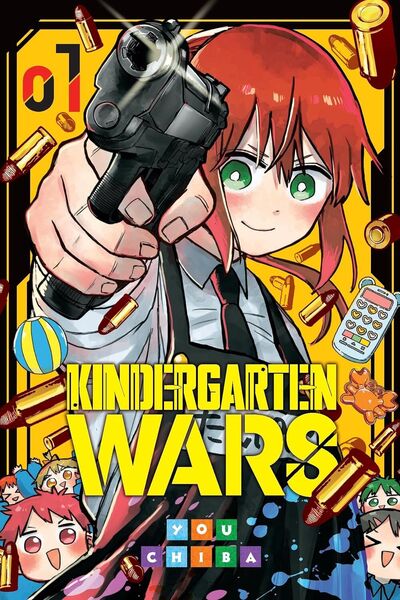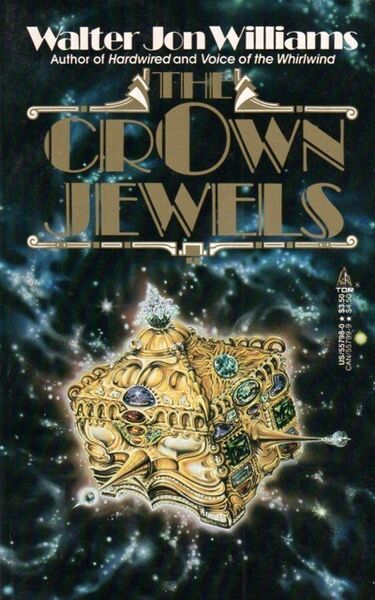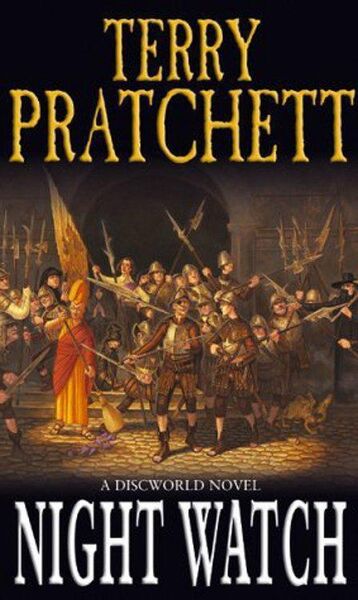


Lonely Rita has no end of meet-cutes with hunky men. If only Rita could stop shooting them in the head...
Kindergarten Wars, volume 1 by You Chiba
Tags:
This year's Wiscon was all-online, and billed as a "gap year," with fewer program items than I'm used to, and no dealers room.
I went to two program items--a "US immigration law and worldwide fandom roundtable" and a panel on "the wild world of modern agtech and why isn't it showing up in current SF."
The roundtable was about as cheerful as you'd expect, with a lot of discussion of both past and feared legal difficulties in traveling to cons, and alternatives like smaller gatherings and online cons. Most of us thought that online wasn't as good as in person, but that it's significantly better than nothing. (There may be some selection bias here: people who didn't think an online con was better than nothing wouldn't bother attending.) And a couple of people noted that their choice has been online or nothing at least since 2020, for reasons like disability or budge that don't have much to do with Trump.
The panel on current and future agriculture was fun. Some of the "what SF is getting wrong" was about TV and movies, showing a garden plot that's much too small for the population it's allegedly feeding, and that the fictional future is even worse/stupider about monoculture than the real world today.
Other than that, I hung out on the Discord server. Most if not all of the program items were recorded, and will be available to convention members for a week after the end of the con, but I may not get around to watching any of them, even less interactive things like readings and the guest of honor speeches.
I went to two program items--a "US immigration law and worldwide fandom roundtable" and a panel on "the wild world of modern agtech and why isn't it showing up in current SF."
The roundtable was about as cheerful as you'd expect, with a lot of discussion of both past and feared legal difficulties in traveling to cons, and alternatives like smaller gatherings and online cons. Most of us thought that online wasn't as good as in person, but that it's significantly better than nothing. (There may be some selection bias here: people who didn't think an online con was better than nothing wouldn't bother attending.) And a couple of people noted that their choice has been online or nothing at least since 2020, for reasons like disability or budge that don't have much to do with Trump.
The panel on current and future agriculture was fun. Some of the "what SF is getting wrong" was about TV and movies, showing a garden plot that's much too small for the population it's allegedly feeding, and that the fictional future is even worse/stupider about monoculture than the real world today.
Other than that, I hung out on the Discord server. Most if not all of the program items were recorded, and will be available to convention members for a week after the end of the con, but I may not get around to watching any of them, even less interactive things like readings and the guest of honor speeches.
Tags:
Started the day by biking down to Walnut Creek for some routine lab work. Dropped by Brioche de Paris for breakfast afterward combined with LHMP reading/note-taking. (My plan to reduce my "eating out expenditures" is being stymied by my current routine of doing LHMP reading in coffee shops. I'm not beating myself up about it, since I also combine it with my bike ride.) Texted the former co-workers to see if anyone wanted to meet up for lunch when I pop over to Berkeley Bowl tomorrow (since Wednesday is their on-site day).
When I brainstormed about how to structure my days in retirement, I came up with the idea of having a list of "activity categories" where I would try to regularly check off a certain number of different categories each day. (The point is the doing, not the checking off.) Most of them are things I'd been doing previously, though not on a close-to-every-day basis, like exercise, yard work, housework, LHMP reading, LHMP blogging, etc. But I added three categories for activities that had largely fallen off my routine: writing fiction (duh!), playing music, and--after some thought--working in non-English languages.
I'm still working on getting the first two into my routines, but yesterday I pulled out a Medieval Welsh text that I haven't previously translated (Owein) and started working through it. It helps that editions of Medieval Welsh texts generally have a glossary at the end, so in the event I don't know a word, I don't have to be going back and forth with a dictionary. But I was a bit surprised at how few items I had to check.
My current process is to copy out the original on every third line of a ruled notebook, take notes for vocab I had to look up, or verb forms I needed to work out on the second line, and write my translation on the third line. Out of two notebook pages, there were four words I didn't know, three I checked but had remembered correctly, and one verb form I needed to look up. There's also a passage where I know all the words, but I'm still working on the overall sense.
It helps that I'm intimately familiar with several of the branches of the Mabinogi, and the overall grammar and vocabulary of the medieval tales tend to be highly similar. (Also: I know the general shape of the literature.) But it was still gratifying to find that I could pretty much sight-translate 90% of the material. After I finish Owein, I want to try some poetry because I want to work up to translating a poem that doesn't appear to have an English translation published yet.
Given all the language study I've done across the decades, it's felt sad that I don't use most of it except as general background radiation. I'd like to brush up on my Latin, and I'd like to get a more formal grounding in reading French (at least academic French), which I can get the overall gist of, but don't have the grammar for.
When I brainstormed about how to structure my days in retirement, I came up with the idea of having a list of "activity categories" where I would try to regularly check off a certain number of different categories each day. (The point is the doing, not the checking off.) Most of them are things I'd been doing previously, though not on a close-to-every-day basis, like exercise, yard work, housework, LHMP reading, LHMP blogging, etc. But I added three categories for activities that had largely fallen off my routine: writing fiction (duh!), playing music, and--after some thought--working in non-English languages.
I'm still working on getting the first two into my routines, but yesterday I pulled out a Medieval Welsh text that I haven't previously translated (Owein) and started working through it. It helps that editions of Medieval Welsh texts generally have a glossary at the end, so in the event I don't know a word, I don't have to be going back and forth with a dictionary. But I was a bit surprised at how few items I had to check.
My current process is to copy out the original on every third line of a ruled notebook, take notes for vocab I had to look up, or verb forms I needed to work out on the second line, and write my translation on the third line. Out of two notebook pages, there were four words I didn't know, three I checked but had remembered correctly, and one verb form I needed to look up. There's also a passage where I know all the words, but I'm still working on the overall sense.
It helps that I'm intimately familiar with several of the branches of the Mabinogi, and the overall grammar and vocabulary of the medieval tales tend to be highly similar. (Also: I know the general shape of the literature.) But it was still gratifying to find that I could pretty much sight-translate 90% of the material. After I finish Owein, I want to try some poetry because I want to work up to translating a poem that doesn't appear to have an English translation published yet.
Given all the language study I've done across the decades, it's felt sad that I don't use most of it except as general background radiation. I'd like to brush up on my Latin, and I'd like to get a more formal grounding in reading French (at least academic French), which I can get the overall gist of, but don't have the grammar for.
Tags:
I'm trying to write a scene where two co-workers are trouble-shooting a new custom security or encryption routine. Someone else (who isn't present) wrote the code and he will have been careful to ensure it works before sending it to them. So maybe something in the implementation of it?
The scene is dual purpose, showing their interaction growing closer while also hiding something else in plain sight. The tech part of it can be whatever is plausible and easy to convey without bogging it down in details. I am so out of touch with that sort of thing I don't know what's plausible any more.
What could go wrong with uploading the new code into their office network or onto their phones which would need a bit of trouble-shooting? The kind of thing one person might overlook and another catch. Preferably with them being literally close while they do this. And again - easy to convey without bogging it down in details. Jargon is fine.
Edit: Turns out jargon is not fine. Well it would be in the sense I meant, but that's not how it was taken. Am overwhelmed by how much I can't understand well enough to follow here, let alone distill into a few phrases. I know the readers for my lakorn-novel are non-existent but I can't swamp them with details.
Edit 2: Sorry to have bothered everyone. I'm just going to trash this. It was a stupid idea in the first place. Thank you for your time.
The scene is dual purpose, showing their interaction growing closer while also hiding something else in plain sight. The tech part of it can be whatever is plausible and easy to convey without bogging it down in details. I am so out of touch with that sort of thing I don't know what's plausible any more.
What could go wrong with uploading the new code into their office network or onto their phones which would need a bit of trouble-shooting? The kind of thing one person might overlook and another catch. Preferably with them being literally close while they do this. And again - easy to convey without bogging it down in details. Jargon is fine.
Edit: Turns out jargon is not fine. Well it would be in the sense I meant, but that's not how it was taken. Am overwhelmed by how much I can't understand well enough to follow here, let alone distill into a few phrases. I know the readers for my lakorn-novel are non-existent but I can't swamp them with details.
Edit 2: Sorry to have bothered everyone. I'm just going to trash this. It was a stupid idea in the first place. Thank you for your time.
(![[personal profile]](https://www.dreamwidth.org/img/silk/identity/user.png) james_davis_nicoll May. 27th, 2025 09:18 am)
james_davis_nicoll May. 27th, 2025 09:18 am)

A flamboyant thief fulfills a seemingly minor commission and wins the attention of an alarming number of patriots from two empires.
The Crown Jewels (Divertimenti, volume 1) by Walter Jon Williams
Tags:

The dark fantasy tabletop roleplaying setting for D&D Fifth Edition and compatible systems from Ghostfire Gaming.
Bundle of Holding: Grim Hollow
Tags:
1998! The Good Friday Agreement gives Tories something new to undermine, Former Conservative Cabinet Minister Enoch Powell makes his greatest contribution to Britain by dying, and Andrew Wakefield's fraudulent paper puts him in the running with Thomas Midgley Jr. for single individual who did the most to undermine public health.
Bold for have read, italic for intend to read,, underline for never heard of it
Which 1998 Clarke Award Finalists Have You Read?
The Sparrow by Mary Doria Russell
Days by James Lovegrove
Glimmering by Elizabeth Hand
Nymphomation by Jeff Noon
The Family Tree by Sheri S. Tepper
Titan by Stephen Baxter
Poll #33168 Clarke Award Finalists 1998
Open to: Registered Users, detailed results viewable to: All, participants: 42
Which 1998 Clarke Award Finalists Have You Read?
View Answers
The Sparrow by Mary Doria Russell
34 (81.0%)
Days by James Lovegrove
1 (2.4%)
Glimmering by Elizabeth Hand
9 (21.4%)
Nymphomation by Jeff Noon
3 (7.1%)
The Family Tree by Sheri S. Tepper
16 (38.1%)
Titan by Stephen Baxter
8 (19.0%)
Bold for have read, italic for intend to read,, underline for never heard of it
Which 1998 Clarke Award Finalists Have You Read?
The Sparrow by Mary Doria Russell
Days by James Lovegrove
Glimmering by Elizabeth Hand
Nymphomation by Jeff Noon
The Family Tree by Sheri S. Tepper
Titan by Stephen Baxter
...with more modern eyes. In this case, as I am still on my Batman kick, this means the 1989 BATMAN movie, which I saw on original release in theaters (and loved).
( Do I still love it? More than I expected, to be honest. )
( Do I still love it? More than I expected, to be honest. )
Tags:
(![[personal profile]](https://www.dreamwidth.org/img/silk/identity/user.png) james_davis_nicoll May. 25th, 2025 09:00 am)
james_davis_nicoll May. 25th, 2025 09:00 am)

Truth, Justice, Freedom, Reasonably Priced Love, and a Hard-Boiled Egg!
(![[personal profile]](https://www.dreamwidth.org/img/silk/identity/user.png) james_davis_nicoll May. 25th, 2025 09:35 am)
james_davis_nicoll May. 25th, 2025 09:35 am)

A time-displaced cop struggles to protect history and the glorious revolution from a time-displaced psychopath, as well as from the cop's own better nature.
Night Watch (Discworld, volume 29/City Watch, volume 6) by Terry Pratchett
Tags:
.
